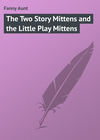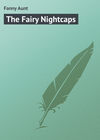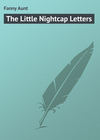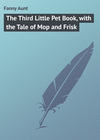Czytaj książkę: «The Big Nightcap Letters», strona 5
"While Mary was helping him to dress, she seemed very snappish and impatient.
"'Do, for goodness sake, keep still, Master Arthur!' she said; 'you are always fidgeting and fussing.'
"'I?' said Arthur, laughing. 'Why, I've been as still as a mouse!'
"Mary was silent for a moment, but presently she exclaimed – 'How carelessly you have washed your hands, your shirt is all wet. I have shown you how to wash without splashing a hundred times. You worry my life out!'
"'I tried to do as you told me,' said Arthur, with a little sigh.
"'Oh, fiddlesticks! don't tell me! You are a terrible boy!' and Mary bounced out of the room, banging the door behind her.
"Arthur went down to breakfast, and ran up to his mother to tell her about Mary. 'I think she was "terrible,"' he said. 'What could be the matter with her, mamma?'
"'Perhaps she was indulging in ill temper,' answered his mother, significantly.
"When they sat down to breakfast there was no toast.
"'I should like a piece of toast,' said Arthur.
"His mother rang a little bell, and the cook came in. She looked first at the mistress, with a peculiar smile, and then she looked at Arthur.
"'Margaret,' said he, 'there is no toast.'
"'I know it, Master Arthur; it was too brown; and you are so hard to suit, that I did not dare to serve it.'
"'I hard to suit?' cried Arthur, who seemed to have forgotten what a naughty boy he had been. 'I hard to suit? Not at all. If the toast is a little too brown, I don't mind it. Give it to me, Margaret.'
"'I threw it away,' said the cook.
"'Oh, well, I'm in no hurry; I will wait while you make me another piece.'
"'My fire has gone out,' said the cook.
"'Well, you can re-light it, can't you?'
"'Do you think I have nothing to do but to wait upon you?' cried the cook. 'You know nothing ever suits you; and you always speak rudely to me;' and she flounced out of the room.
"'How can she say so, mamma?' cried Arthur. 'I speak rudely to her? Why, I was as polite as ever I could be. It is too bad!'
"'Servants find it very hard to attend upon you, Arthur. They are accustomed to polite treatment from the rest of us.'
"'Well – but mamma – to accuse me to-day, when it was she who' —
"'Was indulging in ill-temper,' interrupted his mother.
"Arthur understood, and was silent.
"The hour for his grammar lesson had now arrived. The tutor bowed to Arthur's mother, smiled, and commenced:
"'Do you know your lessons, my young friend?'
"'I have studied them, sir.'
"'Do you know them? It is of little consequence that you have studied them, if you do not know them.'
"'I believe I do, sir.'
"'Well, let us see – begin.'
"'In the tenses,' began Arthur a little embarrassed, 'we should distinguish the moods and the verbs.'
"'Nonsense! you should have said, "In the verbs we should distinguish the moods and the tenses."'
"'Yes, sir, that is what I meant to say; I knew that, but my tongue slipped.'
"'Your tongue slips very often. Continue' —
"Arthur, still more embarrassed, said – 'We should also distinguish the moods and the persons.'
"'You must be demented! What have the moods to do in that sentence? Perhaps you are expecting a visit from the man in the moon, and that makes you talk such nonsense. The grammar says – "We should distinguish the numbers and the persons." Your tongue does nothing but slip; you do not know your lesson.'
"'Excuse me, sir; I do know it.'
"'You are not respectful, Master Arthur,' said the teacher in a cold, severe tone.
"'But, sir' —
"'When a boy knows his lesson he does not make such abominable blunders in reciting.'
"'But, sir, you troubled me; you put me out.'
"'I trouble you? A very singular excuse, and a very poor one. Come, let me look at your composition.'
"But here matters became worse and worse. The master 'pshawed,' and frowned, and grumbled to himself. 'No application! no thought! bad spelling! bad grammar! a perfect mass of faults!'
"Arthur grew red and pale by turns, as his teacher wrote right across the page in large letters: 'A composition so badly done, that it is impossible to correct it.'
"Then he rose coldly, looking very grim, took his hat, and addressing Arthur's mother, said – 'Madam, I cannot consent to teach your son any longer; I have so little success, that I feel I have no right to the very liberal salary you have accorded me. Another, perhaps, will do better.'
"'Oh, sir! no! pray, don't go!' exclaimed Arthur; 'I will try to do better! indeed, I will! upon my word and honor I will. I love you, sir!'
"A pleasant light suddenly came into the teacher's eyes, and a soft smile passed like lightning over his lips.
"'Do, please, give me your hand, sir,' said Arthur, 'and promise me that you will continue to teach me.'
"His broad, black eyebrows immediately contracted into a great frown; and he said gruffly – 'Very well, I will try you once more,' and left the room.
"For a few moments there was silence; then a distressed expression came over Arthur's face, as he said – 'Mamma, my teacher was very – (he was at a loss for a word) very singular with me to-day – don't you think so, mamma?'
"'What do you mean by singular?'
"'Why, not as he usually is – not at all.'
"'His reproofs seemed perfectly just to me; you were not perfect in your lessons.'
"'Well, mamma, I do not deny that; but at all other times he has been so kind and patient, and never treated me with such unexpected severity.'
"'Ah!' said his mother, 'I am afraid, then, that this morning he was indulging in ill temper.'
"Arthur hung his head, and was silent: his conscience was busy whispering to him, and the rest of the morning passed painfully; but after luncheon, he prepared for a walk with joy, for the day was lovely, and the air exhilarating.
"But all at once the sky became overcast, and very soon after the rain fell in torrents.
"'Oh, dear me, how tiresome!' cried Arthur, 'just when I am going to take a walk; it is perfectly hateful.'
"'God sends the rain,' said his mother, gently.
"Arthur hung his head again without answering. What could he say, indeed? But with his new resolution strong in his mind, he determined to bear this disappointment with patience; and he called Jumbo to play with him.
"But the cat, usually so quick to come purring to his knee, remained just where he was, as if he had been suddenly struck deaf, and dumb, and blind. Arthur went to him, and tried to take him in his arms; but he hissed at his playmate, and scampered away with his back and tail high in the air, and hid under the sofa.
"'Ah me!' sighed Arthur, 'I suppose Jumbo is like the rest; he is indulging in ill temper, too.'
"'Not quite that,' observed his mother; 'but animals have memories.'
"'I think you had better say that they are spiteful, mamma.'
"'Perhaps they are, my son; but they have no reason, while we are capable of controlling our impatience, and governing our passions, if we ask God to help us.'
"Upon this Arthur fairly broke down; and, bursting into tears, sobbed out – 'Oh, dear mamma, I understand the lesson I have received from every one to-day. Do believe that I will try with all my strength to conquer my ill temper: I promise you. Do, please mamma, forgive me.'
"His mother wound her loving arms around her son, and tenderly kissed him, and said – 'I forgive you, my dear child, with all my heart, and we will both pray to our Heavenly Father to send down His Holy Spirit to guide and direct your efforts to do right. You have borne your disappointments to-day with patience and resignation; and I feel that you will soon be the good, sweet-tempered boy, you were a year ago.'
"Arthur kept his promise, and whenever he was tempted to give a cross answer, or get in a passion, he was sure to remember in time the celebrated day when everybody, by his mother's instructions, attempted his cure, by showing him, in their own persons, the unlovely consequences of indulging in
ILL TEMPER."
"What a nice story!" exclaimed the children, "and what a good way of curing Arthur – better than a hundred whippings. When we do any thing bad, mamma, you must punish us Aunt Fanny's way. Couldn't you punish us for something now?"
The little mother laughed at this comical request, and said – "I can't think of any thing just now to punish you for; and I hope you don't want to do any thing naughty on purpose."
"O dear, no!" cried the children, but George, with a good-humored twinkle in his eye, added – "At any rate, mamma, the next time Harry puts salt into the sugar-bowl, and makes me spoil my coffee, I intend to put powdered sugar into the salt-cellar for him to sprinkle over his stewed oysters."
"Oh, do!" cried all the children; "only think of oysters and sugar! perfectly dreadful!"
"'Well,' said Harry, laughing, 'I shall have to buy a snuff-box, then, and keep it in my pocket full of salt.'
"'But don't forget yourself,' said Anna, 'and politely offer a pinch of it to the first old lady you meet; she might think you meant to play a trick upon her, you know.'
"'What an idea!' cried Harry; 'I wouldn't do such a thing; I should think it would make her sneeze worse than any snuff. Wouldn't it?'
"'The best way to find that out,' said George, with a roguish smile, 'would be to take a good pinch yourself.'
"While this conversation had been going on, little Johnny had disappeared in the pantry; and now, at this very moment, he came out, screaming: 'Oh! my nose hurts! my nose hurts!' and ran to his mother.
"It seems that, anxious to find out what kind of snuff salt would make, he had privately walked into the pantry, and had snuffed and poked quite a quantity into his poor little nose, and now it smarted as if twenty hornets had stung him at once; and he jumped up and down with the pain.
"They had a great time soaking his nose in warm water, and felt very sorry for him, though they could not, for their lives, help laughing when George said that Johnny had salted and pickled his nose so well, that it would keep in the hottest weather; at any rate, it would last him as long as he lived; which comforted Johnny very much, for he thought that it might have to be cut off to get the salt out.
"After this they bid everybody good night, and went to bed, and Johnny said he felt 'pretty compertuffle.' His mother had told him that 'good little Henry,' of whom you have read, always said 'compertuffle' for 'comfortable,' and Johnny thought it was just the right word to express his feelings."
THE FIFTH LETTER.
THE ROSE CROWN
For Clara
Dear, tender-hearted little Clara: – In the olden time, there was a beautiful superstition in Germany, that on Christmas eve our Saviour, just as he was when a little child here below, comes at midnight in at the door, and fills all those children's shoes with gifts, who have followed His example of goodness and obedience. You know that you hang up your stockings, and Santa Claus comes down the chimney; but the little German children believe that they are far more blessed. It is a beautiful idea, for it brings Him, who for our sakes became a little child on earth, more closely and lovingly to the children's hearts. They grow up sure of His love and sympathy, from infancy to old age.
I have asked Sarah ("the doctor") to write me another story after the German fashion, on purpose for you. She has given me this "Rose Crown;" and the story turns upon the sweet and solemn belief of the German children.
You will perceive that the little Gottfried in the story thought of this with such intensity, and with such perfect faith in its truth, as to cause him to walk in his sleep, like a somnambulist. No doubt your dear mother can tell you many strange and extraordinary stories of somnambulists, who do the most wonderful and startling things while in this kind of trance state, of which they are utterly unconscious when they awake.
I hope this story will please my dear little Clara; it is called
THE ROSE CROWN
"It was Christmas eve, and a cold winter's day. The flakes of snow fell softly and thickly, and had already covered the earth with a white cloak.
"At one of the windows of the large house that stands on the top of the hill, where the purple violets first peep out in the spring-time, stood the little Gottfried and his sister Marie.
"'Only look, dear Marie,' said Gottfried, 'how fast the snow falls! What large flakes! They look like little milk-white doves.'
"'It is the Mother Holle shaking her feather-beds,' cried Marie, laughing; and looking up towards the sky, and beckoning with her hand, she sang —
"'Mother Holle,
Good wife Holle,
Fill the meadows fair and full:
Stay not, pause not,
Shake away,
Make the snow fall fast to-day.'
"'Oh! I can sing a prettier song than thine,' said Gottfried. 'Listen, now. The good wife Katarine taught it to me;' and he sang —
"'See the snow-flakes,
Merry snow-flakes!
How they fall from yonder sky,
Coming lightly, coming sprightly,
Dancing downwards, from on high.
Faint or tire, will they never,
Wheeling round and round forever.
Surely nothing do I know,
Half so merry as the snow;
Half so merry, merry, merry,
As the dancing, glancing snow.
"'See the snow-flakes,
Solemn snow-flakes!
How they whiten, melt and die.
In what cold and shroud-like masses
O'er the buried earth they lie.
Lie as though the frozen plain
Ne'er would bloom with flowers again.
Surely nothing do I know,
Half so solemn as the snow,
Half so solemn, solemn, solemn,
As the falling, melting snow.'
"'Ah! thy song is sad, brother,' said little Marie: 'it makes me sigh.'
"As she spoke, a little boy, poorly clad, was seen coming up the avenue; and Gottfried exclaimed – 'Here comes Heinrich!' and running out of the room, he presently returned, leading by the hand Heinrich, the little faggot-maker, whose mother, a poor but pious widow, lived in a hut just out of the village.
"'Why, Heinrich, where hast thou been this cold day?' asked Marie.
"'Taking my faggots to Herr Kaufferman's,' said the poor boy. 'But oh, Gottfried, they have there the most beautiful Christmas Tree!' and then Heinrich paused and sighed.
"'And to-night the dear Christkindchen, or Holy Child, will bring them presents,' said Gottfried. 'I hope he will fill thy shoes full.'1
"'Alas! the Christ-child never comes to me,' said Heinrich.
"'What! hast thou never heard how he comes at midnight, bearing a lighted taper and a crown of white roses, and gives presents to all the good children?'
"'My mother has told me of this,' said Heinrich, 'and I have waited and watched, but he never comes! He never will come. It was only yesterday that I met Hans, the butcher's son, and he mocked me, and snapped his fingers in my face, and said – "Thou art so poor, that thy shoes will never have any thing in them;" and I was so angry, and wanted to strike him, but my mother said I must never fight or quarrel with any one, and I went away from him; but it is hard to be poor,' and here he began to cry.
"'Ah! yes, it is sad, dear Heinrich; but do not weep; here, wipe thine eyes with my new pocket-handkerchief. Come, now, be happy; and I will pray to the Christ-child, and beg him to come this very night to thee.'
"At this the little faggot-maker's face brightened, and soon after he went away.
"In the evening, the children had their supper, and soon after they stood by the knee of their kind mother, and sang this hymn:
"Jesus, our Shepherd! we ask for thy blessing,
Through the long hours of this dreary night;
Let us not know (thy kind favor possessing)
Danger or sorrow, till morning is bright.
"Jesus, our Saviour! oh! grant thy protection,
To thy dear arms we have trustingly come;
Oh, Lamb of God! make secure our election,
Guard us, and keep us, and call us thine own.
"Jesus, our Crown! Oh, thou Heavenly Glory!
Humbly we kneel, and entreat thee to love,
Bless and receive us, as in Bible story,
Till we shall come to thy mansion above."
"When they had finished the hymn, they reverently repeated their prayers; and then, each bidding the other good night and sweet dreams, went to their white-curtained beds.
"Later at night, their mother came to see that they were warm. Gottfried was still awake; he was troubled about little Heinrich; and he told his mother how the poor boy had grieved because the Christ-child never came to him. 'I have prayed to Him, dear mother; do you think He will hear me?' said the tender-hearted boy.
"'Yes, dear child,' said the mother, 'dost thou not remember what the hymn says?
"'And when, dear Jesus, I kneel down,
Morning and night to prayer,
Something there is within my heart,
Which tells me thou art there."
"'He works sometimes through human hands; and now look thou, my little Gottfried,' continued his mother, kissing him, 'I will make this night a wreath of white roses for thee, and fasten a purse about the stems, with some golden guilders within, and thou shalt take it to Heinrich to-morrow morning.'
"'Ah, thou dearest mother!' cried Gottfried, joyfully, and the loving kisses were pressed upon her cheek. 'The dear Jesus has heard me already;' and kneeling in the bed, he poured out his grateful thanks; and then lying down, he soon fell asleep, with a bright flush of happiness upon his face.
"The snow had ceased to fall, and it was late, but still in the widow's cottage the fitful fire-light (for candles there were none) showed her bending over some work. By her side on the hearth crouched the little Heinrich.
"'Go to bed, dear child,' said his mother; 'it is too late for thee.'
"'Ah, dear mother! let me wait for thee,' answered the boy; 'it is so cold and dark in our little room above.' He was silent for a moment, gazing into the fire in a wishful manner; then he said – 'Mother, dost thou think the Christ-child will indeed hear Gottfried's prayer, and come to me and thee?'
"'I hope he will, my Heinrich,' said the sad mother, smiling faintly.
"'Ah, but mother, dost thou not know it?'
"The fire burned low, and the poor woman could no longer see. She put up the coarse sewing with a sigh, and resting her hand tenderly on her boy's head, sat quite still.
"Not a sound was heard. The light in the room was dim, and gloom had settled upon the hearts of both mother and child.
"Hark! what was that?
"A low tap sounded at the door, and then it slowly opened; and to the astonished gaze of the two sitting by the hearth, there appeared the figure of a little child. A snow-white robe draped his slender limbs. In one hand he bore a lighted taper, and in the other a most beautiful wreath of white roses. His dark blue eyes shone with an unearthly lustre, as it appeared to the amazed and bewildered Heinrich, and his golden curls floated upon his shoulders.
"'Oh! mother! mother!' whispered Heinrich, almost breathless, 'it is the Christ-child in very truth come to me at last. His face is like Gottfried's – only far more beautiful;' and mother and son sank on their knees.
"Slowly the little form advanced towards them, paused before Heinrich, lightly placed the rose crown upon his head, and then, the sweet lips parting in a faint, tender smile, it waved its little hand towards him, and disappeared from their sight.
"When they could speak, the mother and son bowed their heads in thankful prayer, then lifted their brimming eyes to each other.
"'Truly thou hast been wondrously rewarded, my Heinrich,' said the poor widow; 'give the beautiful crown to me, that I may see what the dear Christ-child has brought to thee.'
"She stirred the fire, and put on some light wood to make a blaze, and then Heinrich lifted the crown from his head. As he did so – oh! wonder! there fell from it a silken purse, and through the deep crimson network they could see the yellow gleam of gold.
"With the early blush of morning little Gottfried awoke, and the first thing he did was to run smilingly to the door to find his shoes. There they were, in good truth, crammed to the very top with presents. Marie, too, awoke at the moment, and from each little white bed there arose delighted exclamations and merry shouts of joy.
"Now their mother entered, and said – 'A merry Christmas to you, my children.'
"With joyful kisses they welcomed her, and breathlessly showed her their gifts; then Gottfried exclaimed – 'Oh! mother! I have had such a pleasant dream; I dreamed that the dear Christ-child went to Heinrich with the wreath, and gave it to him.'



















